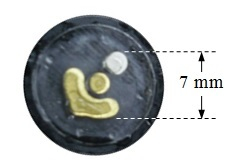- RAMOT at Tel Aviv University Ltd.
- From Israel
- Responsive
- Innovative Products and Technologies
Summary of the technology
A compact 3D electrochemical sensor constructed on a pliant substrate for in-vitro and in-vivo measurements of cells and tissues. The device includes a specially designed sensing layer containging reference electrodes and measurement electrodes that is linked through specially designed via interconnectors to contact pads located in the upper part and connected to a measuring device. The sensor is enclosed in a housing which provides mechanical support and allows controllable movement in three dimensions.
Project ID : 8-2013-461
Details of the Technology Offer
Technology
A compact 3D electrochemical sensor constructed on a pliant substrate for in-vitro and in-vivo measurements of cells and tissues. The device includes a specially designed sensing layer containing reference and measurement electrodes that are connected to contact pads on the back side of the device by uniquely designed via interconnects. The sensor is enclosed in a housing which provides mechanical support and allows controllable movement in three dimensions.
Background and Advantages
Conventional integrated electrode configurations are planar and bottom sensing. The planar configuration of most conventional electrodes requires the placement of cells onto the electrode's surface and the measurement of analytes secreted onto the contact region. This process requires a traumatic preliminary step of detachment of the cells to be tested from their origin – tissue, cell culture, etc. – resulting in poor signal to noise ratio. Our new sensor offers several fundamental advantages: short diffusion distance of secreted analytes towards the electrode surface which improves the signal to noise ratio, increased response time, enhanced analytical performance and increased detector sensitivity. These result in more rapid and sensitive detection of biochemical and physiological processes that are essential for basic research as well as for medical applications. The design and the size of the sensor will offer portability and ease-of-use. The design geometry allows the collection of data without damaging (or otherwise affecting) the cells (even in situ) and provides immediate information on cell physiology. The miniaturization capabilities due to the unique configuration of the proposed device will allow the monitoring of a single cell. The measurements can be performed in a laboratory setting and even during surgery. This new technology allows accurate, rapid and direct diagnosis carried out on small volumes of cells or tissues without the need of transferring or removing the examined samples, thus eliminating the need for pretreatment and labor intensive preparative steps. Changes in the microenvironment of a cell can be easily detected by this approach. The configuration provides a minimized distance between the sensing surfaces in contact with the cell which is essential for improving device sensitivity.

Sense electrodes of 3D electrochemical sensor
(Electrical contact pads on the back side are not shown)
Potential Applications
This structure allows miniaturization down to the micron level and will provide surgeons with a diagnostic tool that can identify the margins of a tumor, contributing to a much more accurate surgical procedure. A miniaturized sensor head can be fitted onto an endoscope allowing for direct contact with identified and suspected pathologies in vivo. It will find use in point-of-care and back office diagnostics.
Patent Status
US provisional patent has been submitted
Project Status
Two generations of proof-of-concept devices have been built and successfully tested on biological samples.

